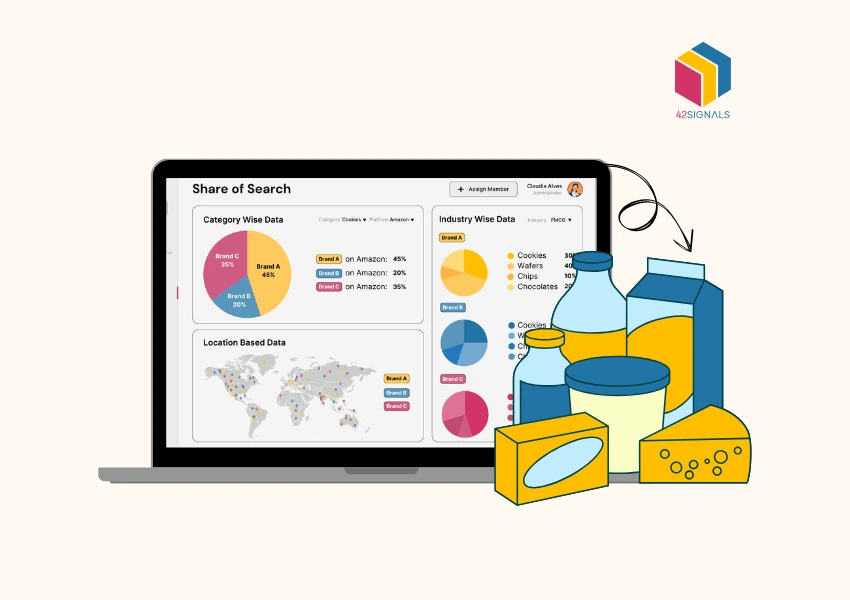What is Search Monitoring?
Search monitoring is a systematic process where businesses track and analyze customer reviews or conversations and trends about specific keywords, competitors, and key industry topics across search engines and social platforms. This technique involves leveraging specialized tools to gather real-time data and insights on how often and where particular search queries are appearing, allowing companies to gauge public interest and sentiment.
By understanding which keywords are trending and identifying patterns in search behaviors, businesses can make more informed decisions around content creation, marketing strategy, and overall positioning in the market.
Search monitoring tools often provide Keyword Ranking Dashboards filled with analytical features, enabling businesses to refine their strategies based on comprehensive search data. This ensures a proactive approach to managing online presence and adjusting to dynamic market conditions effectively.
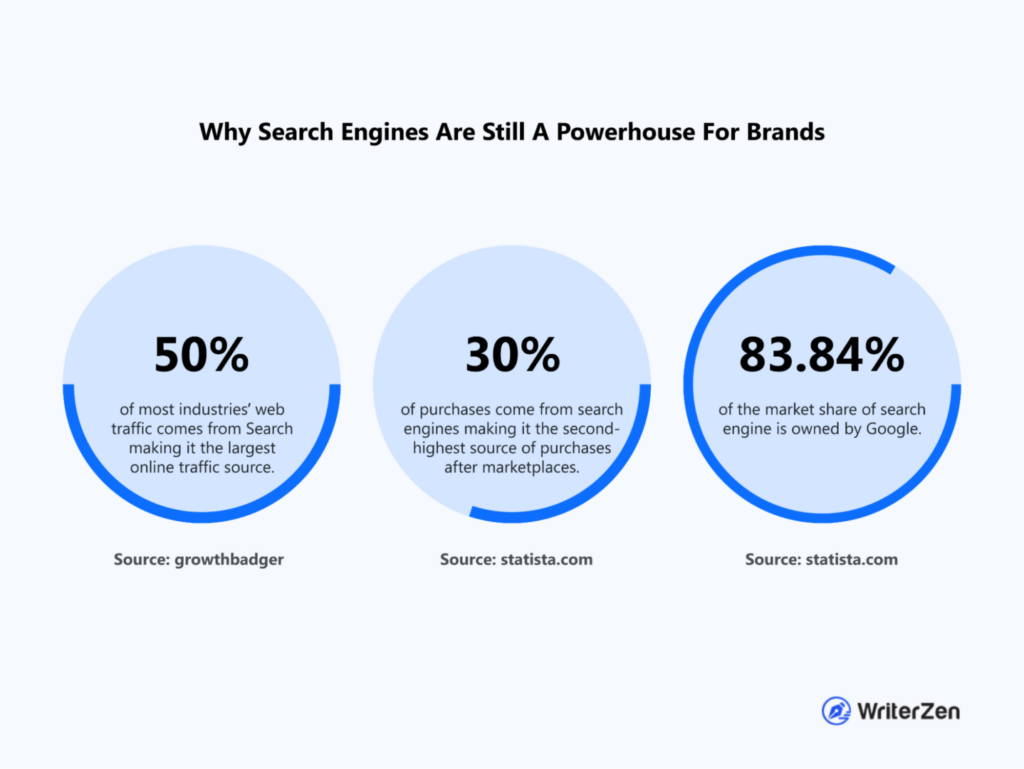
Image Source: WriterZen
What is The Importance of Search Monitoring?
Search monitoring is crucial for businesses as it provides insightful data on consumer behavior, market trends, and competitor strategies. By consistently analyzing search queries and keyword performance, companies can optimize their digital marketing efforts and improve their search engine ranking. This not only enhances visibility and drives more organic traffic but also leads to a better understanding of customer needs and preferences.
Moreover, search monitoring also helps identify potential threats and opportunities, enabling more informed decision-making. Additionally, it plays a key role in reputation management by tracking brand mentions and sentiment. Overall, search monitoring is an essential tool for fostering a data-driven approach to marketing and business strategy.
How Does Search Monitoring Work?
Search monitoring operates through a combination of sophisticated algorithms, data analysis, and real-time processing to track and evaluate search engine performance and related metrics. At the core, it involves several pivotal elements:

Image Source: SemRush
1. Keyword Tracking
The process begins with the identification and selection of relevant keywords containing terms businesses intend to rank for. These keywords are monitored across various search engines, including Google, Bing, and Yahoo.
2. Rank Position Analysis
Algorithms analyze where the business’s web pages stand in search engine results pages (SERPs) for the chosen keywords. This provides insight into the visibility and competitiveness of the web pages.
3. SERP Features Monitoring
Beyond simple rank positions, search monitoring tools also track additional components of SERPs, such as featured snippets, local pack entries, and knowledge panels, determining how these elements affect visibility.
4. Competitor Tracking
Competitor websites ranking for the same keywords are identified and monitored. This allows businesses to compare their performance and strategize accordingly to maintain or enhance their competitive edge. Competitor intelligence is crucial for adapting to changes in the market.
5. Trend Analysis
Historical data on keyword rankings, search volumes, and SERP positions are analyzed to identify trends and patterns. This reveals insights into market dynamics and user behavior over time.
6. Alert Mechanisms
Search monitoring systems often include real-time alerts that notify businesses of significant ranking changes, keyword performance shifts, or new competitors entering the SERP. This proactive approach allows swift responses to potential issues.
7. Comprehensive Reporting
Regular, detailed reports are generated that summarize performance metrics, competitor movements, keyword success, and overall digital visibility. These reports guide decision-making and strategy adjustments for improved search engine performance.
Must-Track Metrics for Effective Search Monitoring
Search monitoring entails tracking diverse metrics, crucial for gauging a business’s online presence. One pivotal metric is keyword ranking, which indicates where a company’s webpage stands on search engine results for specific keywords.
Monitoring keyword performance uncovers trends and helps businesses identify which keywords drive traffic. This data enables companies to refine SEO strategies and allocate resources to high-impact areas.
Another significant metric is organic traffic, providing insights into the volume of visitors coming from search engines. By tracking organic traffic, businesses can measure the effectiveness of their SEO tactics and content marketing efforts over time.
Besides keyword ranking and organic traffic, other key metrics include click-through rate (CTR) and bounce rate. CTR measures the ratio of users who click on a webpage after seeing it on the search engine results page, offering insights into the attractiveness of the webpage’s title and meta description.

Image Source: SemRush
Conversely, bounce rate tracks the percentage of visitors who leave the site after viewing only one page, indicating potential issues with content relevance or site usability. Additionally, monitoring backlinks can help businesses understand which external sites are driving traffic, influencing their search engine ranking. By closely monitoring these metrics, businesses can continually optimize their search performance, ensuring sustained growth and visibility.
Tools and Technologies for Search Monitoring
1. Share of Search by 42Signals
42Signals offers an advanced platform focusing on Share of Search, a critical metric representing the percentage of search volume for a brand compared to its competitors. By leveraging this tool, businesses can:
- Assess Brand Health: Understand market positioning by evaluating shifts in search volume.
- Gauge Consumer Interest: Determine increasing or decreasing interest in products or services over time.
- Benchmark Performance: Compare search performance against market competitors.

2. Google Analytics
Google Analytics remains a staple for understanding web traffic and user behavior. It provides:
- Real-time Monitoring: Track current user activity on the website.
- Keyword Insights: Analyze keywords driving traffic.
- Conversion Tracking: Measure goals and e-commerce performance.
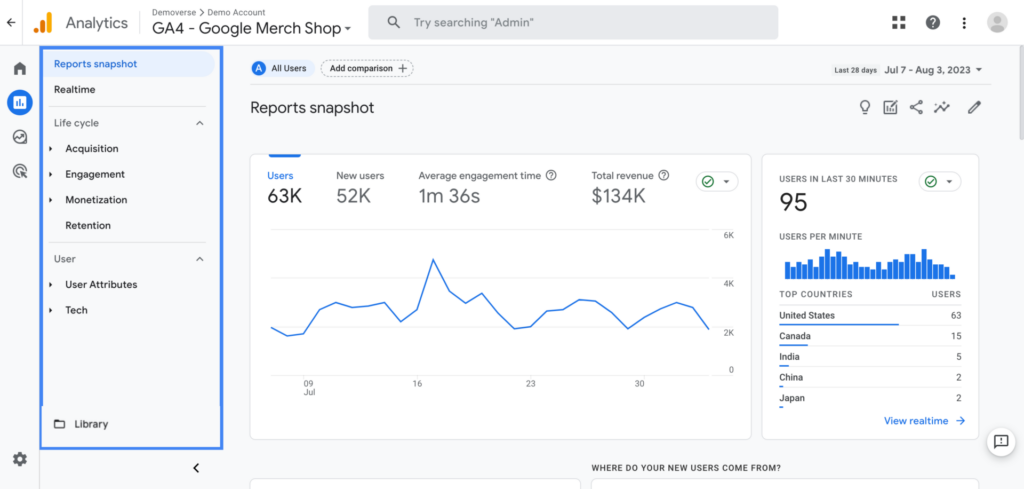
Image Source: Google
3. SEMrush
SEMrush is renowned for comprehensive SEO and search intelligence capabilities. Key features include:
- Keyword Research: Identify high-performing keywords.
- Competitive Analysis: Investigate competitors’ SEO strategies.
- Position Tracking: Monitor changes in keyword rankings over time.
4. Ahrefs
Ahrefs offers robust tools for search and backlink analysis, including:
- Site Explorer: Uncover detailed organic search reports.
- Content Explorer: Discover popular content in a specific niche.
- Rank Tracker: Monitor search positions for target keywords.
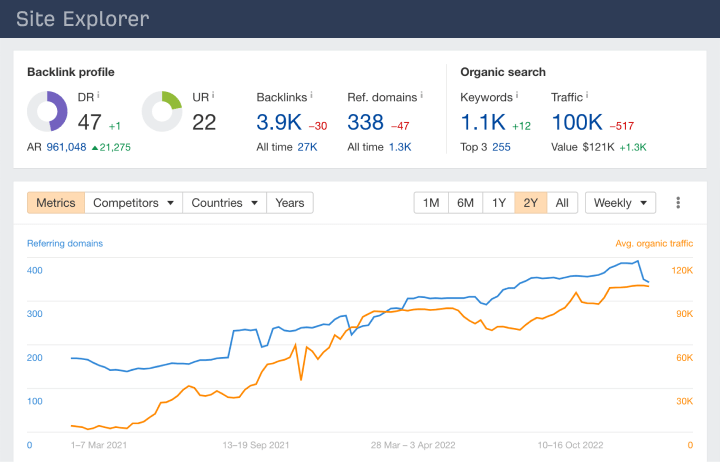
Image Source: AHREFS
5. Moz Pro
Moz Pro provides an array of tools for enhancing search visibility, such as:
- Keyword Explorer: Generate keyword suggestions and metrics.
- Site Crawl: Identify and fix technical SEO issues.
- On-Page Optimization: Recommendations for improving specific pages.
6. Google Search Console
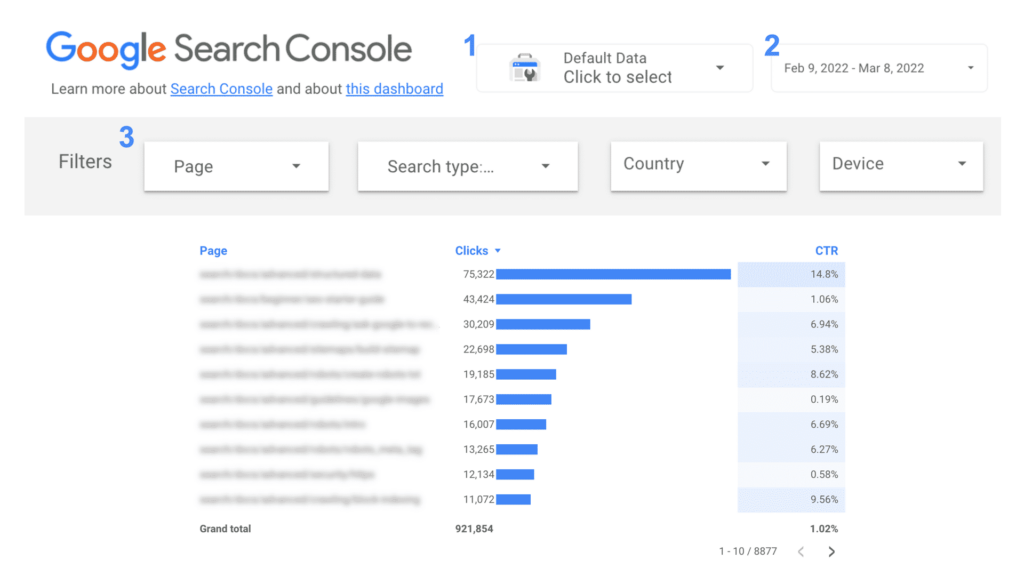
Image Source: Search Engine Journal
Google Search Console offers valuable insights into website performance in Google Search, with features such as:
- Performance Reports: Detailed analytics on clicks, impressions, and positioning.
- Index Coverage: Monitor site indexing status and fix errors.
- Enhancements: Identify and rectify AMP, mobile usability, and rich result issues.
7. Hotjar
Hotjar combines analytics and feedback to understand user behavior and improve site performance. Features include:
- Heatmaps: Visual representation of user interaction.
- Session Recordings: Video recordings of user sessions.
- Conversion Funnel: Identify where users drop off in conversion paths.
Overcoming Common Search Monitoring Challenges
1. Data Overload
Organizations often encounter a deluge of data that makes it hard to filter actionable insights. Excessive data can result in important trends or issues being overlooked due to sheer volume.
2. Algorithm Updates
Frequent search engine algorithm updates can disrupt existing search metrics and invalidate previous strategies. Constant monitoring and adapting to these changes is resource-intensive.
3. Keyword Management
Managing and optimizing a large set of keywords can be complex and time-consuming. Ensuring relevant keywords align with evolving search behaviors and intents is a perpetual challenge.
4. Technical Issues
Crawling and indexing inconsistencies might prevent accurate data collection. Website changes, such as updates or migrations, can impact search visibility and disrupt ongoing monitoring efforts.
5. Competitor Movements
Keeping track of competitors actions in search rankings demands continuous vigilance. Competitor strategy shifts can impact a company’s search visibility and require quick strategic adjustments.
6. Local SEO Variations
Geographic targeting presents unique challenges, with localized search results varying widely. Monitoring local search performance across multiple regions can be laborious and resource-heavy.
7. User Intent Alignment
Aligning content and keywords with user intent requires ongoing analysis and updates. Misinterpretation of user intent can lead to missed opportunities and irrelevant traffic.
8. Resource Allocation
Effective search monitoring requires dedicated tools and personnel, which can strain smaller businesses. Budgeting for comprehensive monitoring tools can be challenging within limited financial resources.
9. Data Accuracy
Ensuring the accuracy of collected data is critical but can be hampered by discrepancies in measurement tools. Inconsistent or inaccurate data can lead to misinformed decisions and strategies.
10. Integrating Insights
Transforming raw search data into actionable insights involves complex analysis. Integration with other marketing and sales tools can be difficult, necessitating robust interfacing capabilities.
Optimizing E-Commerce Strategies with Search Monitoring
Search monitoring is a critical function for e-commerce businesses, enabling them to track and analyze search performance, trends, and customer behaviors. Through effective search monitoring, businesses can gain insights into popular search terms, identify seasonal trends, and optimize their product listings to match customer intent.
This method allows businesses to promptly adapt to emerging demands and improve their search engine rankings, ensuring that customers find their desired products more quickly.
Key benefits of search monitoring for e-commerce include:
1. Improved User Experience
- By analyzing search data, e-commerce businesses can refine search algorithms to deliver more accurate results, enhancing overall customer satisfaction.
- Identifying frequently searched keywords can help in optimizing product descriptions and categories, making navigation seamless.
2. Increased Conversion Rates
- Search monitoring can highlight which terms lead to conversions, helping businesses prioritize high-performing keywords.
- Understanding customer search behavior enables targeted marketing strategies, personalized recommendations, and promotions that attract potential buyers.
3. Inventory Management
- Monitoring search queries can provide insights into product demand, assisting in inventory planning and stock management.
- Businesses can predict trends and ensure stock availability, reducing the chances of missed opportunities and backorders.
4. Competitive Analysis
- Search monitoring tools allow businesses to track competitor rankings and keywords, providing valuable intelligence on market positioning.
- It helps in identifying gaps in the market and adjusting strategies to outperform competition in search results. Search ad monitoring can be particularly useful in understanding competitors’ ad strategies.
Conclusion
Search monitoring is an indispensable tool for businesses seeking to maintain a competitive edge in the digital landscape. By leveraging real-time insights from search data, companies can identify emerging trends, understand consumer behavior, and track competitors’ strategies, ensuring they stay ahead in their respective industries.
With the integration of advanced analytics and dashboards, search monitoring platforms offer an accessible and powerful way to harness the vast amount of information available online.
42Signals stands out as a leader in this space, providing comprehensive and customizable search monitoring solutions tailored to meet the unique needs of each business. Don’t miss out on the opportunity to elevate your business; Contact us today and take the first step toward mastering your digital presence.





